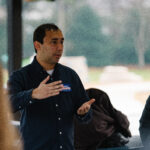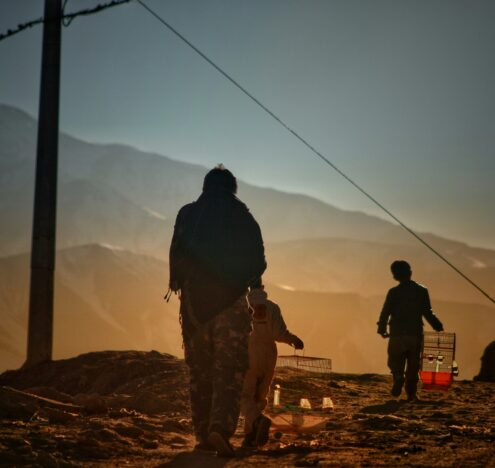Can you have a professional identity without a local professional community?
I’ve been trying to work out the answer to that question since mid-2019, when I quit my day job in London and moved to Lagos, Nigeria, following my wife on an expat assignment and retooling as a freelance researcher and consultant. While I got a head start, thanks to the pandemic, almost all of my counterparts would soon be working remotely as well. As we enter a second year of exclusively remote work and confront a future where remote working has been proposed as the new normal, I admit I have some doubts.
In London, I had been working on US foreign policy for one of Europe’s best-known international affairs think tanks. In 2015, it was easy to believe that we were at the center — or at least a center — of things. But like a lot of liberal internationalist Prestige Institutions, we were caught badly flat-footed by the success of nationalist politics around 2016. Suddenly we weren’t anywhere near the center anymore — or maybe we hadn’t been and it took a series of shock election results to realize that. Still, we could pretty easily fill a room with serious people and have a serious conversation about serious issues. And when something happened in the US — which was an increasingly common occurrence — Europe’s major media often asked us to explain it. In short, I worried about my industry, but I didn’t worry about my place in it.
Lagos isn’t just far away physically from the transatlantic axis where I’d spent my career up until then. It’s also in a different world professionally from Washington DC and London. The major industries here are oil, technology, entertainment and logistics. Nigeria’s foreign relations and security are handled from the capital, Abuja, where the bulk of the foreign diplomatic and NGO corps are also based. If I was going to maintain my career trajectory in Lagos, it was going to have to be entirely remote.
As I settled in, I realized that there are lots of things I didn’t miss about having an office. My commute in London wasn’t bad but over the time I was there, the city seemed to be constantly getting angrier and more crowded. I have never, not even once, missed being in an open-plan office, which is where my desk has been in every job since graduate school. Sitting next to my immediate colleagues was often helpful, but in a big space where different teams are working on different projects and different schedules, it’s very difficult not to feel annoyed when others are relaxing while you chase a deadline — or self-conscious when the shoe is on the other foot. It’s also not a great environment for sustained focus: You can block out sound with a sufficient application of sound-canceling headphones and music, but sometimes you just want silence and not to be fielding random questions. And being in the building more than 40 hours a week means that some significant portion of that time will be absorbed by committee meetings, check-ins and other small tasks that often leave you wondering where your day went — or your week.
Being effective in public policy or international security isn’t entirely about the kinds of deliverables that you can plug into an Excel spreadsheet. It is also about building a mutually supportive and sustainable community that helps refine and improve policies through robust debate and exchange.
And yet, being effective in public policy or international security isn’t entirely about the kinds of deliverables that you can plug into an Excel spreadsheet. It is also about building a mutually supportive and sustainable community that helps refine and improve policies through robust debate and exchange. It’s also about having a professional persona. And being in an office environment, for all of its disadvantages, also makes that persona your default setting for a meaningful amount of time per week.
I’ve wondered about that aspect watching endlessly acrimonious Twitter debates from my home study. I’m not someone who thinks that there’s some high school civics silver bullet that’ll solve the deep and abiding problems with politics and policymaking in the US, Britain, or elsewhere — but I do think that a lot of the mechanisms that we use to communicate in lieu of direct conversation reward toxicity and point-scoring over productive debate. Productive debate happens on Twitter and over email, but they happen despite, not because, of the nature of those platforms.
One thing a wise boss once told me when I was planning one of my first all-day workshops was to think carefully about the number of coffee breaks. I assumed she meant that I shouldn’t let too much of the day be occupied with breaks, but it was actually the opposite. “A lot of the important work at an event like this is going to happen on the sidelines,” she said. “So you need to make sure there’s enough time for that, not just for people to refill their cups.”
It’s tempting — if not necessarily accurate — to generalize from your own experience. But that observation rang all the more true to me as I organized and participated in more events, and then moved away and stopped. What I took away is that we have to be human to each other. That doesn’t mean we should all be friends — that attitude leads to a socially exclusionary bubble that produces groupthink, at best. We have to see people as not just avatars of a viewpoint or policy preference but as people with preferences, habits, blind spots, biases, affections and dislikes. Policy isn’t an unchangeable constant — it’s a result of systems made up of people. You can’t improve it if you don’t understand it, and you can’t understand it if you don’t understand the people who make and shape it.
And that’s really hard to do remotely. Even after a year, our best mechanism for replacing the rhythms and structures of office life is a combination of text chat and videoconferencing. Those tools offer a substitute — thin, limited, and flawed though they may be — for some of the formal exchanges. But they don’t really allow for the development of a professional persona: On Zoom, you’re a head and shoulders, a carefully selected background and some words that hopefully come through without too much loss or distortion. That’s neither a person nor a professional persona. It’s almost impossible to build a relationship with someone you don’t already have some familiarity with using those methods.
I’m also lucky: I switched to remote work at a time when I already had years to develop a network that I could build on. People at the beginning of their careers don’t have that base to build on, and even after a year of working remotely, I don’t see much evidence that we’ve figured out how to replace it.
I’d be lying if I said that I was eager to go back to a mandatory 9 to 5, Monday to Friday office environment. But I’d also be lying if I said I wasn’t looking forward to getting back to working with people instead of through imperfect media. If there’s anything that I hope comes out of all of this, it’s that employers figure out how to offer and sustain a healthy balance between the two.
Jacob Parakilas is an author, consultant and analyst working on US foreign policy and international security. He has over a decade’s professional experience spanning think tanks, NGOs, the US government and academia. Jacob is an Associate with LSE IDEAS and Defense Columnist at The Diplomat. He started his career in 2007 working on student visa issues for the US government before returning to academia, studying the intersection of the drugs trade and public policy at the US/Mexico border at the London School of Economics and Political Science. From 2014 until 2019 he was the deputy head of the US and the Americas Programme at Chatham House, the Royal Institute of International Affairs, where his job was to explain the key issues in US foreign and domestic policy to non-American audiences.
The Future of National Security Work is a series of articles that examine the experience of work during the COVID-19 pandemic, and the future of work once the pandemic has gone. For more in the series, check back here.





















